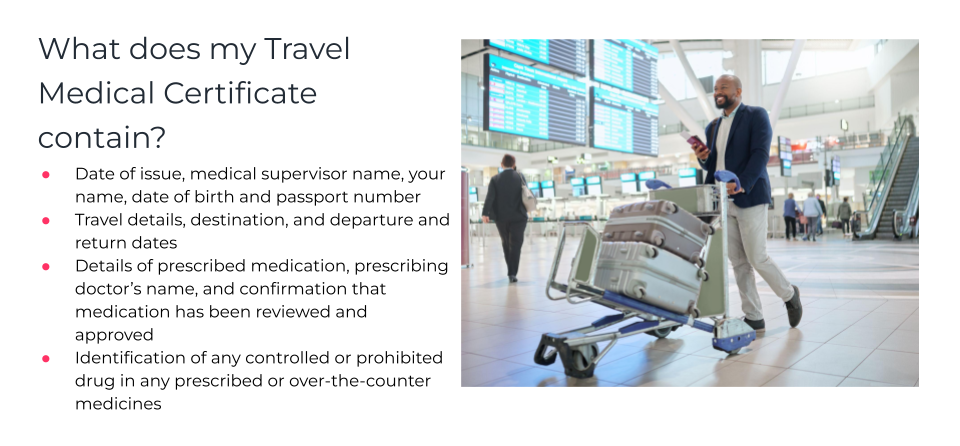Travelling with medications can be a perilous endeavour, especially given the varied restrictions in different countries. Let’s delve into some real-life cases that shed light on the challenges individuals face and how the Travel Medicine Certificate by DocHQ can offer a crucial solution.
Laura Plummer’s Tramadol Trials in Egypt
Laura Plummer’s case exposed the stark contrast in medication legality between the UK and Egypt1. Tramadol, a strong painkiller used to treat moderate to severe pain, is a banned substance in Egypt, though it is available on prescription in the UK. On the 9th of October 2017, a 33-year old British woman Laura Plummer was arrested in Egypt when she was found with the 290 Tramadol tablets in her suitcase after arriving at the Red Sea resort of Hurghada.
Although she didn’t try to hide the medicine, claimed she was unaware Tramadol was a controlled substance in Egypt and further explained that she was simply taking the medication to give her Egyptian partner to treat his back pain2. Laura’s unawareness of this stark difference led to her arrest and a subsequent sentence. Despite her genuine intent to help her partner, she endured a 3-year jail sentence before an early release after 13 months3.
The Travel Medicine Certificate can help travellers identify such disparities and ensure they carry only permitted medications.
Carrie Russel’s ADHD Medication Dilemma in Japan
On February 20th, 2015, Carrie Russel, a 26-year-old woman from Oregon, USA, found herself in a distressing situation while teaching English in Japan4. Little did she know that an innocently shipped package would lead to her detention for 18 days due to prescription pills she had for ADHD.
Carrie’s predicament began when her mother initially sent a three-month supply of her prescribed medication to her address in South Korea, where she was residing at the time. Oblivious to Japan’s stringent regulations on amphetamines, a component in her medication Adderall, Carrie reshipped the unopened package to herself in Japan.
Adderall, a commonly prescribed drug in the United States, contains amphetamines, a substance strictly outlawed in Japan. The unawareness of this discrepancy resulted in her detention.
Fortunately, through the intervention of diplomatic efforts from the US government, Carrie was ultimately released, highlighting the critical need for travellers to educate themselves about a destination’s medication laws and restrictions, preventing unforeseen predicaments during their stay abroad.
Read More: Traveller’s Guide to Medication Restrictions Across the Globe
Perry Coppins’ Anxiety Medication Incident in the UAE
In November 2017, the life of a 61-year-old British man, Perry Coppins, took an unexpected turn when he travelled to the UAE5. Perry, like many travellers, carried his prescribed anti-anxiety medication—Temasepam, Clonazepam, and Citalopram—with him, following all the necessary legal procedures.
However, unbeknownst to him, the UAE had a strict three-month limit on carrying such medications for personal use. Perry, unfortunately, was carrying a six-month supply, inadvertently surpassing the allowable limit. This innocent oversight led to an encounter with customs officials that resulted in his detention.
For five weeks, Perry found himself held in custody, facing the possibility of a four-year prison sentence. The situation highlighted the crucial importance of understanding the medication regulations and restrictions of a foreign country. Even with correct paperwork and legal medication, exceeding quantity limits can lead to unforeseen legal complications during international travel.
Julie Hamp Toyota Extecutive arrested for carrying Oxycodone
In June 2015, Julie Hamp, a former Toyota Motor Corp. executive who had recently relocated to Japan, faced an unexpected ordeal6. Custom officials discovered tablets of oxycodone in a parcel shipped to her from the United States, leading to her subsequent arrest over suspected illegal importation of the painkiller. This incident took place shortly after her move to Japan.
After enduring this distressing experience, she was fortunately released from custody, and prosecutors chose not to press charges in the following month. The incident shed light on the challenges individuals may face when it comes to carrying medications across international borders without carrying out proper research or carrying the right documentation.
Travel Medicine Certificate: Your Partner in Safe Travels

These cases underscore the critical importance of proactive measures before travelling, particularly regarding medication. DocHQ’s Travel Medicine Certificate acts as a safeguard by offering crucial insights into a country’s medication laws. Travellers can use this service to avoid any unforeseen medication-related troubles, ensuring a smooth and hassle-free journey.
References
- British woman jailed over painkillers is freed from Egyptian prison. (2019). Retrieved from https://www.theguardian.com/uk-news/2019/jan/28/laura-plummer-freed-from-egyptian-prison ↩︎
- Egypt drugs case: Briton “had no idea painkiller was illegal.” (2017). Retrieved from https://www.bbc.com/news/uk-41943837 ↩︎
- Laura Plummer: Jailed Briton in Egypt “released.” (2019). Retrieved from https://www.bbc.com/news/uk-england-humber-47025773 ↩︎
- Japan releases American held for 18 days over prescription. (2023). Retrieved from https://apnews.com/general-news-c4ba8f7e6d9d44f3ac904776b7d ↩︎
- Taking these prescription drugs into Dubai could get you arrested. (2018). Retrieved from https://www.independent.co.uk/travel/north-africa-middle-east/uae/dubai/dubai-prescription-drugs-rules-uae-medication-tourists-can-you-take-law-illegal-customs-a8143916.html ↩︎
- Toyota executive freed in Japan after arrest on drug charges. (2015). Retrieved from https://www.theguardian.com/business/2015/jul/08/toyota-executive-freed-in-japan-julie-hamp ↩︎



